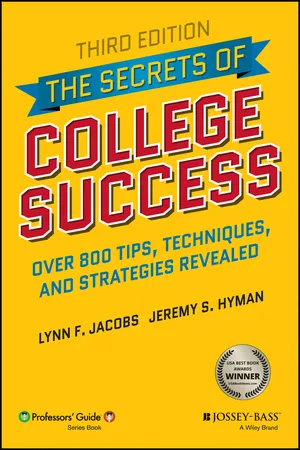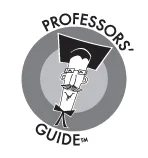
- English
- ePUB (mobile friendly)
- Available on iOS & Android
The Secrets of College Success
About this book
Are you among the 22 million students now enrolled in college? Or a high school student thinking of joining them shortly? Or perhaps a parent of a college-bound junior or senior? Then this book is just for you. Written by college professors and successfully used by tens of thousands of students, The Secrets of College Success combines easy-to-use tips, techniques, and strategies with insider information that few professors are willing to reveal. The over 800 tips in this book will show you how to:
- pick courses and choose a major
- manage your time and develop college-level study skills
- get good grades and manage the "core" requirements
- get motivated and avoid stress
- interact effectively with the professor or TA
- prepare for a productive and lucrative career
New to this third edition are high-value tips about:
- undergraduate and collaborative research
- summer internships
- staying safer on campus
- diversity and inclusion
- disabilities and accommodations
…with special tips for international students at US colleges.
Winner of the 2010 USA Book News Award for best book in the college category, The Secrets of College Success makes a wonderful back-to-college or high-school-graduation gift –or a smart investment in your own college success.
Frequently asked questions
- Essential is ideal for learners and professionals who enjoy exploring a wide range of subjects. Access the Essential Library with 800,000+ trusted titles and best-sellers across business, personal growth, and the humanities. Includes unlimited reading time and Standard Read Aloud voice.
- Complete: Perfect for advanced learners and researchers needing full, unrestricted access. Unlock 1.4M+ books across hundreds of subjects, including academic and specialized titles. The Complete Plan also includes advanced features like Premium Read Aloud and Research Assistant.
Please note we cannot support devices running on iOS 13 and Android 7 or earlier. Learn more about using the app.
Information

1
THIS IS COLLEGE
- 10 Things You Need to Know About College (but Probably Don't)
- The 15 Habits of Top College Students
- The 10 Worst Self-Defeating Myths
- 10 Ways to Get Motivated at College
- The 11 Secrets of Getting Good Grades in College
- 14 Ways to Ensure You Graduate in Four Years
- Top 10 Tips for Community College Students
- 10 Best Tips for Engineering School
- The College Student's Bill of Rights
10 Things You Need to Know About College (But Probably Don't)
- You're in charge of this thing. For many students, the most striking thing about college is that there's no one there to hold your hand. Picking courses, getting to class, doing the reading, and figuring out what's going to be on the test and what's expected on the papers—all of these are things you're going to have to do pretty much on your own. Sure, there are profs (and, in some schools, TAs) who'll give instructions and offer suggestions from time to time. But you're the one who'll have to take responsibility for hauling your butt out of bed when it's ten degrees below zero—or one hundred and five above, depending on what school you're at—and doing what you need to do.
- Your parents may not be much help. Some students are on their smart phone five times a day, or tweeting ten times a day, looking for advice from Mom or Dad. But even the best-intentioned parents can lead you astray. Colleges are different—and, in many cases, much improved—from what they were twenty-five years ago, and professors' expectations have changed accordingly. Suggestion: tune down (or, in some cases, tune out) the parents until you have a firm handle on what's expected at your college—today.
- Attendance isn't required—but is expected. One of the first things many students discover is that college classes can be huge: 100, 200, and, at some state schools, even 700 students in a lecture. In such an anonymous environment, it's the easiest thing in the world to tell yourself there's no good reason to bother going to class. (Even if your school has small classes, attendance typically counts for only a tiny percentage of the grade, if at all.) But professors assume you've made all the classes, and they have no hesitation about asking a midterm or final question that focuses on the contents of a single lecture. Kinda makes you want to go, doesn't it?
- Content is doled out in large units. You may be used to getting your content in short, entertaining blasts: the one- to three-minute YouTube video, the abbreviation-filled IM, the 140-character tweet. But the professor is thinking in terms of the fifty-minute lecture, divided into only two or three main segments; and the author of the journal article is thinking in terms of twenty-five pages of densely written argument, divided into perhaps three or four main sections. Bottom line? You've got to adjust your focus from quick bursts of content to sustained argument. And retrain your attention span to process long—very long, it'll seem—units of content.
- Up to two-thirds of the work is done outside of class. Contrary to what you might have heard, the lecture portion of the course is the least time-consuming activity. That's because (with the exception of a few very basic, introductory courses) the professor is expecting the bulk of the work to be done by you, on your own. Doing the reading and homework; preparing for the quizzes, tests, and presentations; doing research and writing papers—all of these are activities that can easily eat up more than half the time you put into any given course.
- A C is a really bad grade. Many first-year college students—and even some students who've been at college for a while—think that if they get C's in all their classes they're doing just fine—or at least adequately. But what these folks need to know is that in some college courses the grade distribution is 20 to 30 percent A's, 30 to 60 percent B's, and only 15 to 30 percent C's. Set your sights accordingly.
- Not everyone who teaches is a prof. At many state universities—especially those where the student-faculty ratio is 15 to 1 or greater—much of the teaching is done by graduate students. At some of the better state schools only very advanced graduate students are allowed to teach their own courses. But at other schools (we won't mention names because we want to keep our jobs), the lecturer can be a first-year graduate student who might not even have majored in the field in college. Moral? Whenever possible, take courses with regular faculty, who'll be more experienced and, in the best cases, will actually have done research in the subject they're teaching.


- It's the product that counts. Many students think that effort counts. That's why, when papers are returned, there's always a line of students waiting to argue how many hours they worked, how many articles they read, and how hard they've been trying in the course. The thing is, in college what counts most is the product: the paper (not how it was produced), the test (not how much you studied for it), and the oral presentation (not how much you knew about the subject, but couldn't quite get out).
- Understanding is more than just memorizing. While some intro courses require some memorizing (vocabulary in world or foreign languages, theorems in math, names and dates in history), some beginning courses will include essays on the exams. And in virtually every advanced or upper-division course, you'll be asked not just to regurgitate what you've memorized from the lecture or textbook, but to do some analysis, apply the concepts to some new cases, or organize the material or data in some new or interesting way. Pretty different from what you may be used to.
- The prof's on your side—and wants to help. Many students see the professor as an enemy to be defeated—the person who'll trick you with all sorts of gotcha questions on the test and who's very stingy come grade time. But really, the professor is eager to teach you and (believe it or not) would like to see you do well. That's because, in many cases, he or she has forgone a much more lucrative career in business or industry for the sole purpose of educating college students—like yourself. So when the prof invites you to come to an office hour, go to a review session, or just communicate by e-mail or Skype, consider the possibility that the professor really means it. Because he or she probably does.
The 15 Habits of Top College Students
- Have a goal. They have a definite reason for being in college—and know what it is. Could be a future career, graduate or professional school, or just wanting to further their education. But it's almost never because their parents told them to go to college, or because it's the next thing to do after high school, or because they're too unimaginative to think up anything else to do with their time.
- Set priorities. For every student, college is a balancing act bet...
Table of contents
- COVER
- TABLE OF CONTENTS
- ADVANCE PRAISE FOR THE SECRETS OF COLLEGE SUCCESS
- MEET THE PROFESSORS
- PREFACE TO THE THIRD EDITION
- INTRODUCTION
- TOP 10 REASONS TO READ THIS BOOK
- THE PROFESSORS' GUIDE™ ICONS
- 1 THIS IS COLLEGE
- 2 IN THE BEGINNING …
- 3 SKILLS 3.0
- 4 SPECIALTIES OF THE HOUSE
- 5 IT'S SHOW TIME!
- 6 OVERCOMING CHALLENGES
- 7 INTERFACING WITH THE PROFESSOR
- 8 IN CASE OF EMERGENCY …
- 9 THE SECOND HALF
- 10 MOVING ON
- THE END—AND THE BEGINNING
- INDEX
- END USER LICENSE AGREEMENT